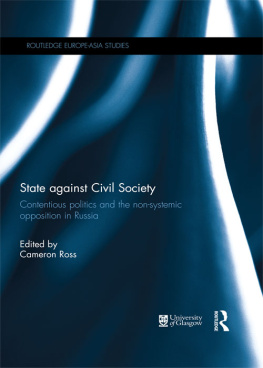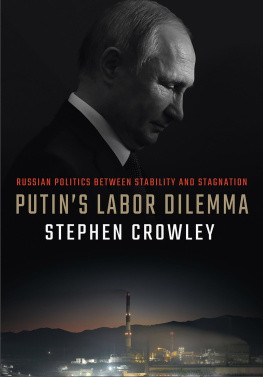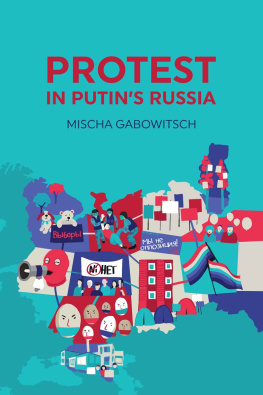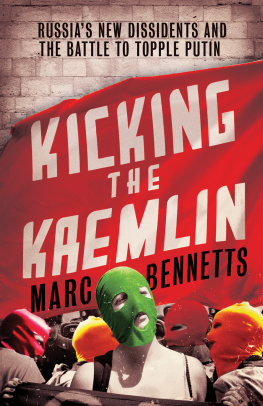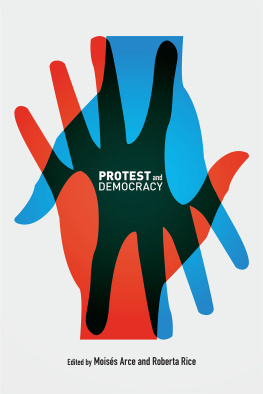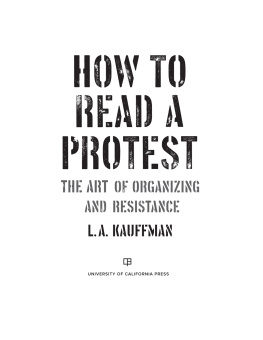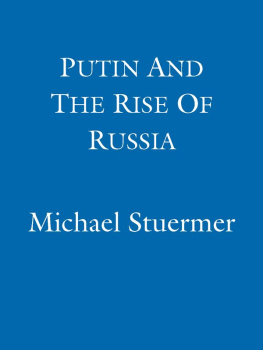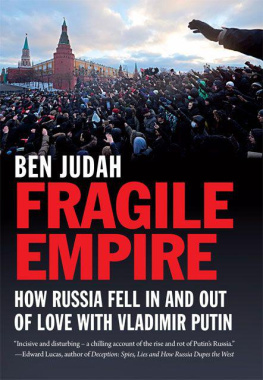Contents
Guide
Pages
To Jacob, and to the memory of Jim Clark (19312013)
Protest in Putins Russia
Mischa Gabowitsch
Translated from the German and Russian, and revised and updated, by the author
polity
First published in German as Putin kaputt!? Russlands neue Protestkultur,
Suhrkamp Verlag, 2013
This English edition Polity Press, 2017
Polity Press
65 Bridge Street
Cambridge CB2 1UR, UK
Polity Press
350 Main Street
Malden, MA 02148, USA
All rights reserved. Except for the quotation of short passages for the purpose of criticism and review, no part of this publication may be reproduced, stored in a retrieval system, or transmitted, in any form or by any means, electronic, mechanical, photocopying, recording or otherwise, without the prior permission of the publisher.
ISBN-13: 978-0-7456-9628-7
A catalogue record for this book is available from the British Library.
Names: Gabowitsch, Mischa, 1977- author.
Title: Protest in Putins Russia / Mischa Gabowitsch.
Other titles: Putin kaputt!?. English
Description: Cambridge, UK ; Malden, MA : Polity Press, [2016] | First published in language as Putin kaputt!?, (c) Suhrkamp Verlag, 2013. | Includes bibliographical references and index.
Identifiers: LCCN 2016020510| ISBN 9780745696256 (hardback : alk. paper) | ISBN 9780745696263 (pbk. : alk. paper)
Subjects: LCSH: Protest movements--Russia (Federation)--History--21st century. | Russia (Federation)--Politics and government--1991
Classification: LCC HN530.2.Z9 S62413 2016 | DDC 303.48/40947--dc23 LC record available at https://lccn.loc.gov/2016020510
The publisher has used its best endeavours to ensure that the URLs for external websites referred to in this book are correct and active at the time of going to press. However, the publisher has no responsibility for the websites and can make no guarantee that a site will remain live or that the content is or will remain appropriate.
Every effort has been made to trace all copyright holders, but if any have been inadvertently overlooked the publisher will be pleased to include any necessary credits in any subsequent reprint or edition.
For further information on Polity, visit our website: politybooks.com
Acknowledgements
The German version of this book owes its existence to Katharina Raabe, the editors editor if ever there was one. She persuaded both its author and its original publisher, Suhrkamp, of its usefulness, kept me on track through near-weekly meetings and untiringly dispensed reassurance, advice and real-time copy-editing. At Polity Press, I thank John Thompson, Clare Ansell, Elliott Karstadt and especially George Owers for their unflinching patience with the slow pace of the translation and revisions, which contrasted unfavourably with the impressive speed with which they organized the production process. Ian Tuttle was the ideal copy-editor eagle-eyed yet laid-back. My great regret is that Jim Clark did not live to read the English manuscript. Jim was an exceptionally sunny and unpresumptuous man who was always willing to place his expertise and experience from an outstanding fifty-year career as an editor of social science books at the service of budding authors. He died days before I completed the German text.
Nor would I have been able to produce either version of this book without the unqualified support of my colleagues at the Einstein Forum, unmatched by anything I have previously experienced at workplaces in six countries. Working with Dominic Bonfiglio, Matthias Kro, Susan Neiman, Martin Schaad, Andreas Schulz, Goor Zankl and Rdiger Zill is a constant source of intellectual pleasure rivalled only by the efficiency of Antonia Angold, Gabriele Karl and Liane Marz. Special thanks are due to Susan Neiman, whose long-standing encouragement and backing has been crucial to all my intellectual endeavours for a decade, and to Goor Zankl, who put in countless hours to help with PEPS.
The German edition owed a great deal to the Hamburg Institute for Social Research and the Berlin Colloquia on Contemporary History, and in particular Bettina Greiner, Bernd Greiner and Martin Bauer, who let me try out some of my ideas in various settings. Similarly, this revised edition benefitted in numerous ways from the support of the Research Centre for East European Studies at Bremen University and the Alexander von Humboldt Foundation, which covered the costs of several workshops and meetings with Russian colleagues. I also wish to thank colleagues at universities and other institutions in Basel, Berlin, Bremen, Bucharest, Frankfurt (Oder), Hamburg, Lyon, Minden, Moscow, Paris, Potsdam, Saint Petersburg, Tbingen, Vienna and Zurich for letting me present some of my ideas at seminars, conferences or in public lectures as I was preparing the English manuscript. Special thanks are due to participants in panels and workshops on the qualitative and quantitative analysis of slogans and protest events that I organized in Berlin (2012), Boston (2013) and Moscow (2014), the latter with invaluable help from Yulia Skokova, who also commented on portions of the manuscript, as did Laurent Thvenot, whose intellectual support has been one of the great blessings of my life as a sociologist. I am also deeply grateful to three anonymous reviewers, who read the whole manuscript, for their nuanced comments and helpful criticism.
For comments and advice on various points, in person or in writing, I thank Alexandra Arkhipova, Joseph Boyle, Olga Bronnikova, Karine Clment, Donatella della Porta, Jan Matti Dollbaum, Yekaterina Khodzhayeva, Ivan Klimov, Alexey Kozlov, Bjrn Kunter, Alexey Levinson, Andrey Makarychev, Nikolay Mitrokhin, Zara Murtazaliyeva, Olga Nikolaeva, Asmik Novikova and Irina Soboleva. Helena Flam and Jan Plamper provided valuable suggestions on uses of the history and sociology of emotions. Ansgar Gilster and Jan Philipp Fiedler created the map of Moscow used in this book. Olga Rosenblum provided a constant stream of new material on protest events in Moscow in particular, and conducted additional interviews based on my guide. Olga Sveshnikova, at Bremen University, has been my most important collaborator in building and maintaining PEPS, and a team of assistants, above all Manarsha Isayeva, made vital contributions to data collection. Felix Hermann helped transfer the database to an online format.
An invitation by the Centre for Cultural History at South Ural State University enabled me to carry out fieldwork in Chelyabinsk. For helpful information on politics and protest in the Chelyabinsk region, I thank Anton Artemov, Rozaliya Cherepanova, Kirill Gontsov, Daniil Maltsev, Igor Sibiryakov, Natalya Zaretskaya and Konstantin Zharinov.
Engaging in the study of protest in Russia provided welcome opportunities to continue years of stimulating conversations with Alexander Bikbov. Alexander and several other members of the Independent Initiative for the Study of Protest generously exchanged interviews and observations with me. So did members of the Collective for the Study of Politicization and the Laboratory for Public Sociology (Ksenia Ermoshina, Anna Kadnikova, Maxim Kulayev, Artemy Magun, Ilya Matveev, Andrei Nevskii, Olga Nikolaeva, Natalia Savelieva, Natalia Sherstneva, Inna Silova, Maria Turovets, Dilyara Valeyeva, Svetlana Yerpyleva, Anna Zhelnina, Oleg Zhuravlev) and several members of the Folklore of the Snow Revolution research group. Andrey Semenov as well as several other members of the Centre for Comparative History and Political Studies in Perm provided a constant stream of references and ideas, as did Olessia Lobanova, in Tyumen, the main contributor to protestrussia.net.Several members of the iDecembrists also provided help at crucial stages of my work.




